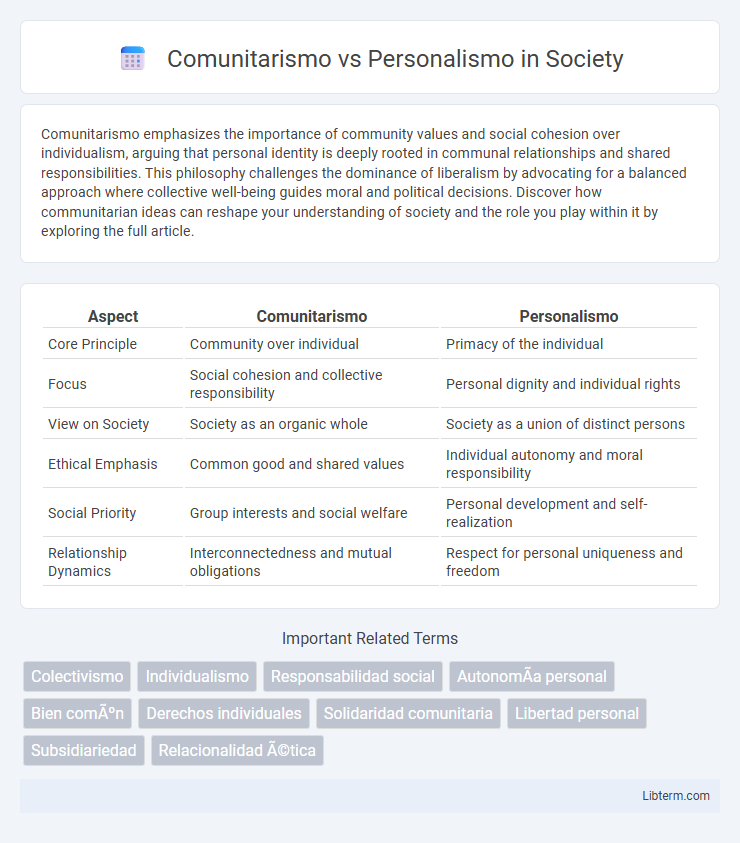Comunitarismo emphasizes the importance of community values and social cohesion over individualism, arguing that personal identity is deeply rooted in communal relationships and shared responsibilities. This philosophy challenges the dominance of liberalism by advocating for a balanced approach where collective well-being guides moral and political decisions. Discover how communitarian ideas can reshape your understanding of society and the role you play within it by exploring the full article.
Table of Comparison
| Aspect | Comunitarismo | Personalismo |
|---|---|---|
| Core Principle | Community over individual | Primacy of the individual |
| Focus | Social cohesion and collective responsibility | Personal dignity and individual rights |
| View on Society | Society as an organic whole | Society as a union of distinct persons |
| Ethical Emphasis | Common good and shared values | Individual autonomy and moral responsibility |
| Social Priority | Group interests and social welfare | Personal development and self-realization |
| Relationship Dynamics | Interconnectedness and mutual obligations | Respect for personal uniqueness and freedom |
Introducción al Comunitarismo y Personalismo
Comunitarismo emphasizes the primacy of the community and social relationships in shaping individual identity and moral values, advocating for collective responsibility and social cohesion. Personalismo centers on the inherent dignity and worth of the individual, highlighting personal freedom, self-realization, and the relational nature of human beings. Both philosophies address the balance between individual autonomy and social interconnectedness, offering distinct approaches to ethics, politics, and social organization.
Orígenes Filosóficos de Ambas Corrientes
Comunitarismo finds its philosophical origins in thinkers like Aristotle and Hegel, who emphasize the social nature of human beings and the importance of community in shaping individual identity. Personalismo, grounded in the works of Emmanuel Mounier and Martin Buber, centers on the inherent dignity and individuality of the person, highlighting relationships as foundational to personal development. Both currents arise from contrasting views on the balance between individual autonomy and collective responsibility in ethical and political theory.
Principales Conceptos del Comunitarismo
El comunitarismo enfatiza la prioridad de la comunidad sobre el individuo, destacando valores como la solidaridad, la responsabilidad social y la interdependencia. Este enfoque sostiene que la identidad y el bienestar personal se construyen dentro del tejido social, donde las normas y tradiciones comunes fortalecen el sentido de pertenencia. A diferencia del personalismo, que centra su atencion en la dignidad y autonomia individual, el comunitarismo propone que las relaciones comunitarias constituyen la base fundamental para el desarrollo humano.
Fundamentos del Personalismo
Fundamentos del personalismo se centran en la dignidad intrinseca e irrenunciable de la persona humana, afirmando que cada individuo posee un valor unico que debe ser respetado y promovido. Este enfoque filosofico subraya la importancia de la libertad, responsabilidad y autonomia personal frente a las estructuras sociales o comunitarias que podrian limitar la expresion individual. La etica del personalismo defiende que las relaciones humanas deben basarse en el reconocimiento mutuo y el respeto, promoviendo el desarrollo pleno del ser en su singularidad.
Diferencias Clave entre Comunitarismo y Personalismo
Comunitarismo emphasizes the importance of the community and social cohesion in shaping individual identity, while Personalismo prioritizes the inherent dignity and autonomy of the individual. The key difference lies in Comunitarismo's focus on collective responsibilities and social roles versus Personalismo's advocacy for personal freedom and self-expression. This contrast highlights divergent approaches to balancing social obligations with individual rights in ethical and philosophical contexts.
Impacto en la Sociedad y la Política
Comunitarismo emphasizes the role of community values and social responsibilities, promoting collective well-being and influencing policies that prioritize social cohesion and public welfare. Personalismo centers on individual dignity and interpersonal relationships, impacting political frameworks by advocating for leadership based on moral character and personal integrity. The tension between these philosophies shapes societal dynamics, balancing communal obligations with personal rights in governance and social development.
Aplicaciones Prácticas en la Vida Cotidiana
Comunitarismo emphasizes the importance of community values and social responsibilities in shaping individual behavior, promoting cooperation and collective well-being in daily interactions such as neighborhood initiatives and workplace teamwork. Personalismo prioritizes individual dignity, personal relationships, and moral integrity, influencing practices like personalized education and one-on-one conflict resolution. Both philosophies offer practical frameworks for balancing social cohesion with personal autonomy in everyday decision-making and interpersonal dynamics.
Críticas y Desafíos de Cada Enfoque
Comunitarismo faces criticism for potentially suppressing individual autonomy by prioritizing community values over personal rights, risking conformity and marginalizing dissenting voices. Personalismo, while emphasizing individual dignity and autonomy, can be challenged for fostering excessive individualism that undermines social cohesion and collective responsibility. Both approaches grapple with balancing individual freedoms and communal welfare, creating ongoing debates about the ethical limits and practical applications of each framework in diverse societies.
Intersecciones y Puntos de Convergencia
Comunitarismo and Personalismo share a focus on the intrinsic worth of individuals within a social framework, emphasizing the balance between community bonds and personal dignity. Both philosophies converge on the idea that individual identity is shaped through relationships and communal values, promoting mutual respect and social responsibility. Their intersection lies in advocating for a society that honors personal freedoms while fostering collective well-being and ethical interconnectedness.
Perspectivas Futuras: ¿Coexistencia o Contraposición?
Comunitarismo and Personalismo present distinct philosophical frameworks shaping future societal models, with Comunitarismo emphasizing collective responsibility and social cohesion, while Personalismo prioritizes individual dignity and personal relationships. Emerging trends in global ethics and political theory suggest potential coexistence through hybrid approaches integrating community well-being and individual rights. Ongoing debates highlight challenges in balancing communal values with personal autonomy, indicating nuanced interactions rather than absolute opposition in future social organization.
Comunitarismo Infographic

 libterm.com
libterm.com